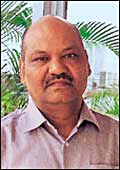|
Michael
holding, the much feared West Indian fast bowler of the seventies,
earned the epithet "Whispering Death" not just for his
blistering pace but also for his smooth and silent approach to the
wicket. Now Finance Minister Palaniappan Chidambaram certainly won't
be as menacing as Holding if you plump the cherry in his hand, but
"Whispering Death" is one turn of phrase that comes to
mind when you consider the unobtrusive and swift manner in which
the soft-spoken minister laid to rest any further prospects of disinvestment
(of profitable public sector undertakings). Last fortnight, when
addressing the press in Mumbai after a power lunch with industrialists,
the self-styled minister for investments murmured: "After a
prolonged period of investment drought, I see investments picking
up. Bankers and industrialists have told me that a rush of investments
is likely over the next 10 months."
The implication of that ostensibly feel-good
(oops!) sound-byte wasn't lost on the chieftains straining to pick
up any stray signal of pro-industry initiatives from the CFO of
the United Progressive Alliance government. Mukesh Ambani, Chairman
& Managing Director, Reliance Industries, had little doubt about
what was screaming between those lines: It's goodbye to strategic
sales of PSUs-of MTNL and BSNL, Shipping Corporation of India, Nalco,
Hindustan Copper, NFL and RCF. For India Inc, it's back to the drawing
board, as they begin to dig out mothballed blueprints for new projects
and expansions.
 |
"We can't keep
waiting for the government sell-offs to happen. We have to concentrate
on building new assets"
Anil Agarwal/ Chairman/Sterlite Industries |
Disinvestment may not cut much ice with the
UPA government, but on a good day even the communists would probably
grudgingly acknowledge some of its many merits. Just one of them
is that disinvestment and privatisation can do their bit to contain
the ballooning fiscal deficit-after all, between 2000-01 and 2003-04
the government sold strategic stakes in 28 PSUs and stashed up Rs
24,527 crore courtesy those efforts.
More significantly, though-at least from industry's
point of view-PSU share sales also present companies with a quick,
surefire avenue for achieving size and scale. Consider, for instance,
Sterlite's acquisition of a 51 per cent holding in Balco in March
2001 for Rs 550 crore, which took the company's marketshare up from
4 per cent to 20 per cent in primary aluminium and also provided
a readymade entry into rolled products and extrusions. Similarly
RIL's acquisition of a stake in IPCL has reinforced the Ambani's
dominance in petrochemicals.
Sterlite and Reliance may be relieved that
Balco and IPCL, respectively, are in the bag, but then again the
Ambanis have now got to kiss Hindustan Petroleum goodbye and Sterlite's
Anil Agarwal can bid adieu to dreams of adding Nalco and Hindustan
Copper to his metals empire. Others, like Essar Shipping for instance,
can't aspire anymore for Shipping Corporation. So what do they do?
The answer is simple: If you can't acquire, you begin to build.
Pronto. As Amit Chandra, Managing Director, DSP Merrill Lynch, points
out: "Companies that were sitting on cash and counting on significant
M&A opportunities arising out of privatisation will have a greater
interest in looking at greenfield projects, wherever it makes economic
sense.''
 |
"We will have to rework
our growth plans. We will now look at more Greenfield and brownfield
expansions"
Kumar Mangalam Birla/ Chairman, Aditya Birla Group |
Changing Tracks
Sure enough, corporate India isn't wasting
any more time. "We can't keep waiting for the government sell-offs
to happen. We have to concentrate on building new assets,"
shrugs Sterlite's Agarwal. Adds Director (Finance) Tarun Jain: "Growth
in the next three years will come from greenfield expansions."
Sterlite has an over $2 billion (Rs 9,018 crore) pipeline of brownfield
and greenfield projects in aluminium, alumina, copper and zinc.
Kumar Mangalam Birla, Chairman of the Aditya
Birla group, doesn't view the end of disinvestment as a setback.
"It just means that we will have to rework our growth plans.
We will now look at more Greenfield and brownfield expansions."
Already group company Hindalco, which wants to be amongst the top
10 global players in aluminium, has revived the Rs 11,000 crore
Aditya Aluminium project in Orissa, which was in cold storage since
1999. Another group company Indo-Gulf had its sights trained on
National Fertiliser, the country's largest urea producer, and Madras
Fertiliser. Now, as DSP Merrill's Chandra explains: "Since
a number of fertiliser companies are sitting on huge cash, one will
see investment happening once there is clarity in the fertiliser
policy." K.K. Birla group Zuari-Chambal Fertilisers and Chemicals,
for its part, is reportedly focusing on a 1 million tonne urea project
in south Asia, now that NFL is off the radar.
 |
Reliance may be relieved
that IPCL is in the bag, but then the Ambanis have to now kiss
Hindustan Petroleum goodbye
Mukesh Ambani/ CMD, Reliance Industries |
Companies in industries like steel, which has
been riding an upcycle for some time now, are working overtime to
make up for the days lost. Jindal Stainless for instance, which
had extended its bid for the Steel Authority of India's Salem steel
plant, decided in mid-May that there was no point in waiting. And
waiting. "We have already wasted two years waiting for Salem
to happen. Now that the steel cycle still looks positive, a decision
was taken last month to expedite a downstream expansion by setting
up a CR steel plant," says Arvind Parakh, Director (Finance),
Jindal Stainless. The company is going in for a brownfield expansion
of its cold rolled capacity at Hissar in Haryana and will spend
about Rs 150 crore to up its CR capacity from 90,000 TPA to 1,40,000
TPA in the next eight to 10 months.
Clearly, however, acquisitions have their advantages,
the biggest one being immediate capacity addition. If, for instance,
Essar Shipping had succeeded in bagging SCI, it would have at a
stroke acquired a fleet of 87 vessels, accounting for 42 per cent
of the national tonnage. Now Prashant Ruia, Director, Essar Shipping,
says: "We will focus more on acquiring individual vessels."
Reliance too, which was hoping to acquire 34 per cent in HPCL, will
now have to pull out all stops to put up its own retail outlets.
The target for 2004-05: 2000 outlets, out of the rights for 5849.
RIL will also miss HPCL's distribution infrastructure as that would
have helped in selling the processed products from Reliance's 33
million tonne Jamnagar refinery. Chidambaram may be right about
the rush of investments, but given a chance industry would have
preferred the shorter cut of disinvestment to gain size and scale.
|
